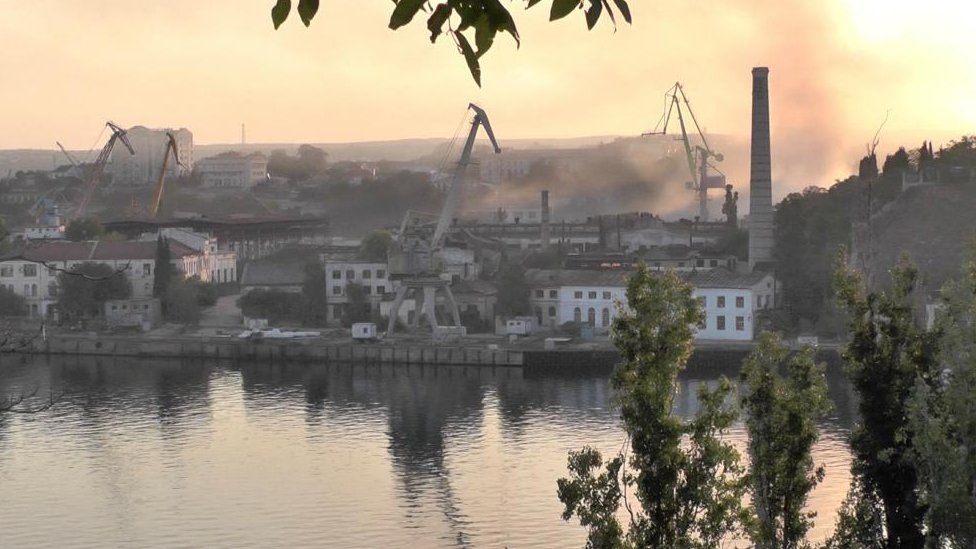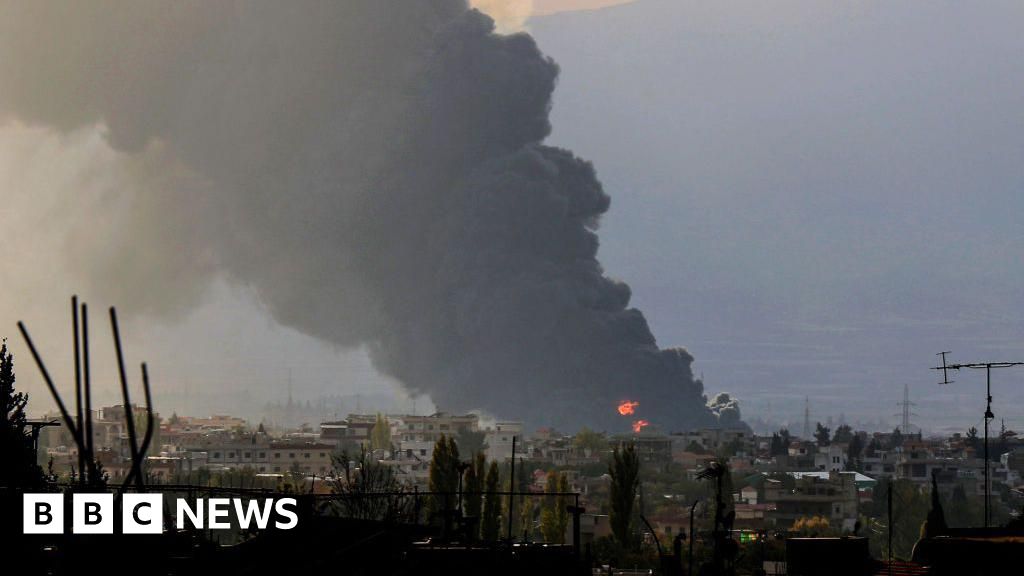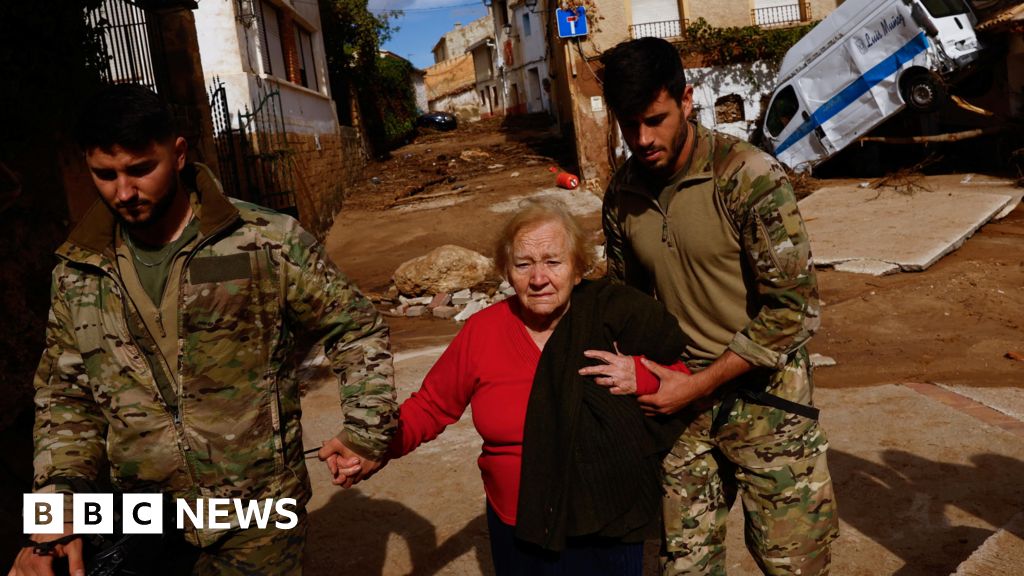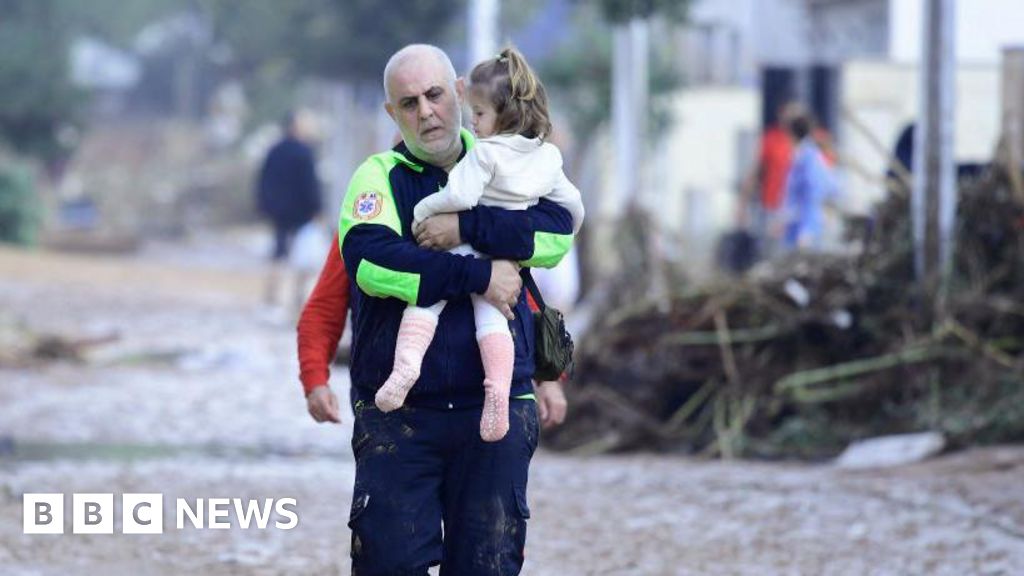ARTICLE AD BOX
 Image source, Reuters
Image source, Reuters
Smoke rises from a shipyard in the Russian-held Crimean port of Sevastopol
By Paul Adams
Diplomatic correspondent, in Kyiv
This week saw spectacular Ukrainian attacks on the Crimean Peninsula, hitting Russian warships and missiles.
Estimates of the damage done ran into billions of pounds and raised the question: is Ukraine getting ready to retake Crimea, which Russia annexed in 2014?
Crimea is a Russian fortress, so it is important not to get carried away.
"The strategy has two main goals," says Oleksandr Musiienko, from Kyiv's Centre for Military and Legal Studies.
"To establish dominance in the north-western Black Sea and to weaken Russian logistical opportunities for their defence lines in the south, near Tokmak and Melitopol."
In other words, operations in Crimea go hand-in-glove with Ukraine's counter-offensive in the south.
"They depend on each other," Musiienko says.
Let's look at Ukraine's recent successes in Crimea.
On Wednesday, long-range cruise missiles, supplied by the UK and France, dealt a heavy blow to Russia's much-vaunted Black Sea fleet at its home port of Sevastopol.
Satellite images of the scene at the Sevmorzavod dry dock repair facility showed two blackened vessels.
Image source, Black Sky via Reuters
Image caption,Britain's Ministry of Defence said two Russian ships had been badly damaged in the attack
On Friday, Britain's Ministry of Defence said a large amphibious landing ship, the Minsk, had "almost certainly been functionally destroyed".
Next to it, one of Russia's Kilo class diesel-electric submarines, the Rostov-on-Don - used to launch Kalibr cruise missiles hundreds of miles into Ukraine - had "likely suffered catastrophic damage".
Perhaps equally importantly the dry docks - vital for maintenance of the entire Black Sea fleet - would likely be out of use "for many months", the ministry said.
On Saturday, Ukraine offered tantalising new details.
It said special forces had played a key role, using boats and an unspecified "underwater delivery means" to get ashore, before using "special technical assets" to help identify and target the vessels.
But with the fires barely out in Sevastopol there were more dramatic night-time explosions as Ukraine blew up one of Russia's most modern air defence systems, an S-400, around 40 miles (64km) north at Yevpatoria.
This was another sophisticated operation that used a combination of drones and Ukrainian-made Neptune missiles to confuse and destroy a key component of Russia's air defences on the Crimean Peninsula.
A significant side note: Russian attempts to use exactly this technique over Kyiv have generally failed, largely thanks to the presence of US Patriot interceptor missiles.
Thursday was the second time in less than a month that Ukraine has knocked out an S-400 surface-to-air missile system on the peninsula.
On 23 August, at Olenivka, on the western tip of the Tarkhankut Peninsula, Ukraine managed to destroy another launcher and a nearby radar station.
Russia was thought to have not more than six S-400 launchers in Crimea. Now it has lost two.
But these are only some of Ukraine's recent operations.
Others have knocked out Russian radar positions on offshore gas platforms and, according to Kyiv, used experimental maritime drones to attack a hovercraft missile carrier at the entrance to Sevastopol harbour.
With its airbases, troop concentrations, training grounds and the Black Sea fleet, Crimea has been a key target since Russia's full-scale invasion last year.
"In Crimea, they still have a lot of stockpiles, with artillery shells and other types of weapons," Musiienko says. "And this is the main logistic supply line for them."
Over the months, Kyiv's operations have grown in sophistication, from a drone attack in August 2022 which destroyed an estimated nine Russian aircraft at the Saky air base, to the combined drone and missile attacks of today.
With more advanced weapons thought to be in the pipeline, Musiienko expects Ukraine to launch ever more sophisticated operations.
"When we get ATACMS (tactical ballistic missiles) from the United States, I think we will try to use - in one attack - ballistic missiles, cruise missiles and also drones," he says.
"And that will be a serious problem for Russia's air defence system," he adds.
"We will try to blind them."
Each successful attack, he says, makes the next one easier. "We are clearing the way, and it's becoming more simple."
The latest reports from Washington suggests the Biden administration is close to approving the ATACMS long range missile system after months of Ukrainian lobbying.
Does any of this mean that Kyiv is getting closer to its goal of liberating Crimea?
"It's getting closer, but there's still a lot to do," says retired Ukrainian navy captain Andriy Ryzhenko.
"We need to liberate the Sea of Azov coast and cut the land corridor," he says, referring to Ukraine's slow, grinding offensive in the south.
And then there is the Kerch Bridge.
Ukraine has been hitting Moscow's lifeline to Crimea for almost a year, but Russian heavy equipment still moves along its vital railway.
Despite being much better defended now, it remains very much in Kyiv's sights.
Image source, Reuters
Image caption,This file picture from July shows damage apparently caused by a Ukrainian attack on the Kerch Bridge, which links Crimea and Russia
"When we shut down the Crimean bridge, it will be a logistical problem for them," Ryzhenko says, with some understatement.
Cutting off Crimea would be catastrophic for Russia and provide a welcome boost to Ukraine's difficult southern offensive.
So is all this a prelude to a Ukrainian effort to retake the peninsula?
Observers here in Kyiv are trying not getting ahead of themselves.
"I think this could be a preparation for the liberation of Crimea," Musiienko. "But I understand that it will take time.
"What we're trying to do right now is clean the way to Crimea."
On Saturday, the Secretary of National Security and Defence Council, Oleksiy Danilov, said Ukraine was using every means at its disposal to force Russia to abandon Crimea.
"It looks like if the Russians do not leave Crimea on their own," he said in a radio interview, "we will have to 'smoke them out'."

 1 year ago
13
1 year ago
13








 English (US)
English (US)